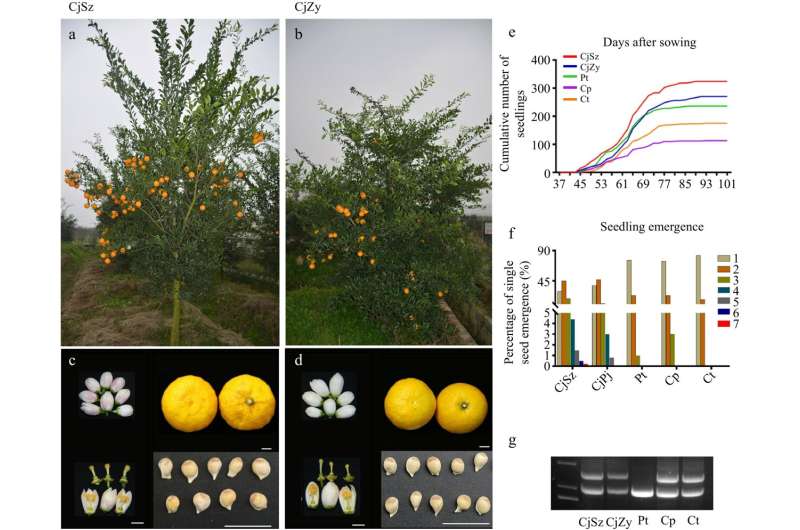This article has been reviewed according to Science X's editorial process and policies. Editors have highlighted the following attributes while ensuring the content's credibility:
fact-checked
proofread
Advancing citrus cultivation: The superior tolerance and growth vigor of 'Shuzhen No.1' rootstock

Citrus is the world's most economically significant fruit crop, but it faces various environmental adversities that restrict its distribution. Grafting is a crucial factor in enhancing citrus productivity. Current research focuses on selecting genetically uniform rootstocks, such as trifoliate orange for its disease resistance. However, issues such as sensitivity to alkalinity and incompatibility with certain cultivars persist.
Addressing these challenges, a study published in Fruit Research introduces "Shuzhen No.1," a novel rootstock with superior growth, cold resistance, and adaptability to alkaline soils, assessing its performance in comparison to traditional rootstocks and evaluating its potential to improve citrus cultivation under diverse environmental conditions.
This study employed a systematic approach to evaluate polyembryony and seedling emergence traits in various citrus rootstocks, assessing their performance under different abiotic stresses and in graft combinations.
Seedlings of two genotypes of Citrus junos Sieb. ex Tanaka "Shuzhen No.1" (abbreviated as CjSz) and commonly used rootstock "Ziyang Xiangcheng" (abbreviated as CjZy), as well as three other commonly used rootstocks including citrange, trifoliate orange, and red tangerine, were used as testing materials.
The initial observations revealed that CjSz rootstock outperformed other rootstocks with a high emergence rate and polyembryonic ratio. Moreover, the rootstock demonstrated superior adaptability to alkaline and freezing stresses, showing the smallest decrease in leaf photosynthetic pigments.
CjSz exhibited high resilience with significant increases in MDA levels and antioxidant activities under stress. The comprehensive evaluation of rootstocks, integrating various physiological and biochemical parameters, confirmed CjSz's outstanding performance across multiple stress treatments.
In graft compatibility tests, CjSz-supported scions exhibited robust tree vigor and high leaf greenness, indicating great graft compatibility and promising potential for enhancing citrus cultivation resilience.
According to the senior researcher, Prof. Xiaorong Wang, "Our findings provide valuable insights for the application of 'Shuzhen No.1' and future research on citrus rootstock." The method and results of this study are significant contributions to citrus horticulture, and provide a foundation for future studies focusing on rootstock selection and breeding for stress tolerance.
More information: Wen He et al, Comprehensive evaluation of abiotic stress tolerance and graft compatibility of Citrus junos cv. 'Shuzhen No.1', Fruit Research (2023). DOI: 10.48130/frures-0023-0042
Provided by Maximum Academic Press





















